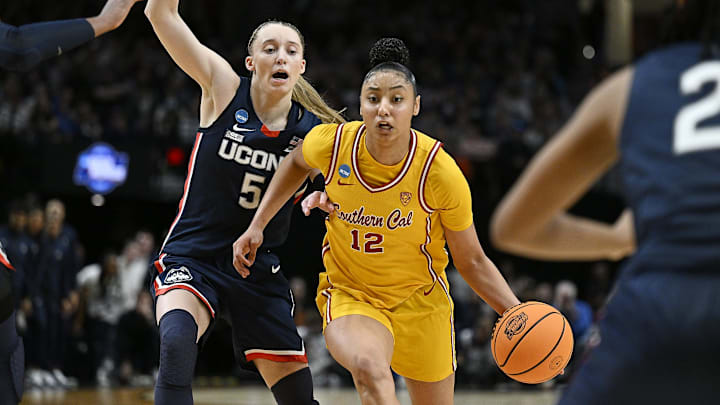Women's Hoops Will Produce the First College Athlete With a Signature Shoe

In the age of NIL, college athletes are more famous than ever. Now able and incentivized to partake in personal brand-building, athletes can eclipse levels of fame once thought only possible by those in the professional ranks. With this newfound fame has come equal interest from brands looking to tap into the new influencer market of college athletes and their highly tribal fanbase. Still, one feat has yet to be accomplished by a collegiate athlete while still in school: a signature shoe deal.
A shoe deal is, without a doubt, one of the highest honors an athlete can receive. Many college athletes have paired with athletic apparel brands in NIL partnerships, but none have received a signature shoe. This is admittedly wrapped up in semantics; college athletes have received player edition shoe deals in which a company will create a unique design with branding and a colorway to honor a specific athlete to an existing shoe. Kiki Rice became the first ever Jordan Brand NIL athlete in 2022 and was met with her own ‘Cherry Blossom’ player’s edition of the Air Jordan 38.
However, no college athlete has reached the pinnacle of the shoe game, receiving their own silhouette, or as it's known in the business, a signature shoe. Former Nike brand marketing executive Jordan Rogers believes this will change, and he thinks the first to crack the code will come from the women’s college basketball ranks.
The women’s basketball world is better suited to provide athletes with the necessary timeline for a signature shoe deal. Unlike their men’s basketball counterparts, who can join the NBA at 19, women cannot enter the WNBA until they are 22 in the calendar year in which the draft takes place. Transcendent superstars in men’s college basketball who would be the target for a shoe deal are virtually always off to the NBA too soon; according to Rogers, “The process of creating a signature shoe takes about 18 months, and with the men's one-and-done rule, it makes it really challenging.”
Under the WNBA collective bargaining agreement, women must stay on campus longer and have prolonged fame as college athletes. It is entirely reasonable that in the post-Clark era, with more eyes than ever on the women’s game, a player could accomplish this feat while in school. UConn's Paige Bueckers won the AP Player of the Year Award as a freshman in the 2020-21 season, posting an insane 20-point, 4.9-rebounds, and 5.8-assist stat line. This was before NIL was available to athletes and before vast media attention was given to women’s basketball. It would be completely reasonable that if Bueckers's freshman campaign took place in this upcoming season, she would be sporting her own signature shoe by her junior year.
For a male basketball phenom to get a shoe line, the process would have to start before they even step onto campus. This is something many brands will be reluctant to undertake for a multitude of reasons. The first is the relative immaturity of such athletes; according to Rogers, “The challenge with giving out a major deal for a signature shoe to such young stars is exactly that: they will be young. Mikey [Williams] ended up losing his Puma deal after his run in with the law.”
A signature shoe deal is an expensive endeavor that goes far beyond the cost of signing an athlete. A recent article from Roger’s, Much Ado About Signature Shoes, outlines this: “Making a signature shoe is a long and challenging process. Sketching, designing, gathering a dedicated team, getting specific time with busy athletes, pulling a real story & inspiration, trying to do anything unique, sampling from overseas, global shipping, re-sampling, getting athlete feedback, allowing them real time to play in the shoe, gathering design team feedback, executive team feedback, retailers & consumers feedback…it's a lot.”
Spending any significant amount of a company’s finite resources on an athlete who has yet to prove themselves at the collegiate level, let alone the professional level, opens a company to a level of risk that, outside of a generational talent yet to be seen, is risky at best.
One challenge for men’s and women’s players stems from their school's apparel contracts. Unlike professional leagues, whose unions have fought for their athletes to maintain the right to wear and sign footwear deals with companies outside exclusive on-court apparel manufacturers, college athletes are constrained to wear the brand partnered with their university during games. New Mexico once enshrined this right for student-athletes in their state NIL legislation, but sadly, further amends to the law have eliminated this protection: you can read more on that here.
Game time is a brand's most valuable ad space, and investing in a signature shoe that can only be worn off-court is a fruitless venture for both parties involved. New Balance recently signed projected 2025 NBA first-round pick Cooper Flagg to a NIL apparel contract; however, during every game he plays during his tenure at Duke, he will be laced up in Nike sneakers. Every highlight of his play will bear the Nike logo: game broadcasts, sports center highlights, thumbnail pictures on articles, and even TikTok compilation videos.
Student-athletes lack leverage in these negotiations as only the brand partnered with their school can provide the on-court ability of a signature shoe. However, with the continued proliferation of the transfer portal, it isn’t unimaginable that an athlete may regain some leverage as their agents could shop around NIL signature shoe offers from companies that have apparel contracts at other programs.
Professional athletes outside of basketball have received signature shoe deals, but football and basketball reign supreme regarding collegiate athlete visibility. Football players, like women’s basketball players, have to stay in college for at least three years, alleviating the one-and-done concerns of men’s basketball. However, true transcendent freshmen are rare in football, players often are obscured behind facemasks, and the signature shoes a company would make can’t be worn on the field. Signing a college football athlete to a signature shoe deal seems far-fetched.
Consequently, Rodgers believes that “The Ladies are best set up for this… with the rise of social media and an emphasis on true capitalization of NIL on the women's side, instead of getting paid from an NIL Collective, we will see a signature shoe on the women's side before we see it on the men's.” Rogers lays out something important: women crush the non-collective NIL game. While this may upset some male athletes who are also prolific influencers, by and far, when it comes to social media and becoming a transcendent figure in culture, not just sport, it is the women who reign supreme: look no further than Caitlin Clark, Angel Reese, Livvy Dunne, Paige Bueckers, and many more. When it comes to collegiate signature shoes, the future is female.
